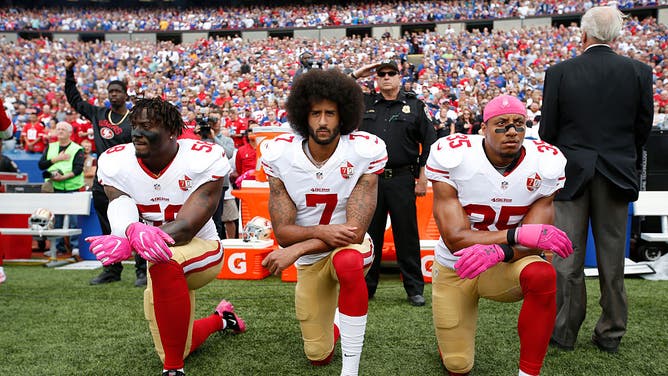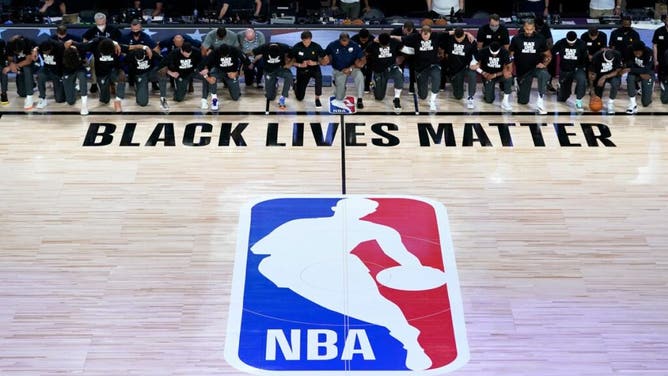The NBA Was Never Going To Catch The NFL In Popularity | Bobby Burack
Christmas Day used to be the one day on the calendar on which NBA basketball was a tradition. For many fans, Christmas Day was the unofficial start of the NBA season, ignoring the prior two months.
The NBA was to Christmas what the NFL is to Thanksgiving. The ratings were, on average, monstrous.
Yet Christmas Day no longer belongs to the NBA. It belongs to the NFL.
Ratings for the NBA and NFL's Christmas matchups on Monday have started to trickle in. The Chiefs-Raiders matchup drew 29 million viewers. 49ers-Ravens averaged 27 million.
You see those numbers and understand why the NBA has not published its Christmas Day viewership: most of the country was watching football, not basketball.
OutKick's Clay Travis noted that more people watched the Raiders-Chiefs game than any NBA game but one (NBA Finals Game 7 in 2016) in the entire 21st century.
While certainly an eye-popping statistic, the NFL's dominance over the NBA has continually grown over the past five years. And that statement is particularly noteworthy when you consider the national discussion just five years ago.
In 2018, several members of the sports media predicted the NBA would soon overtake the NFL as the most popular sport in America.
That talking point was a topic on ESPN for months:
The prediction was, of course, comical. The NBA was never going to catch the NFL. In fact, the NBA would've had to leap both MLB and college football just to be second to the NFL in popularity.
Still, it's interesting to look back at 2018 and see how the NFL grew and how the NBA faded. Oh, how the leagues have changed.
Back in time, we go:
First, predictions that the NBA would unseat the NFL were mostly wishful. See, the media wanted the NBA to unseat the NFL.
The NBA is a more media-friendly league. Its progressive politics closer align with most members of the sports media.
What's more, ESPN controlled much of the sports talk conversation five years ago. The Ringer, Barstool, OutKick, and FS1 were all yet to truly breakthrough into the mainstream conversation.
At the time, ESPN was in a well-documented feud with the NFL over the network's negative coverage of the league's handling of concussions, Ray Rice, and Colin Kaepernick.
As a result, then-ESPN president John Skipper shifted focus toward the NBA and away from the NFL by promoting NBA voices -- like Stephen A. Smith, Jalen Rose, Michelle Beadle, and Rachel Nichols -- as the faces of the network.
Several advocates for the NFL -- like Chris Berman and Ron Jaworski -- had either been demoted or released. Thereby the sports-talk conversation was inherently slanted in favor of the NBA.
That said, it was true that the NBA was hot five years ago while the NFL was cold -- for their respective standards, of course.

Colin Kaepernick doesn't think the NFL is changed, is not living in reality. (Photo by Michael Zagaris/San Francisco 49ers/Getty Images)
The ratings for the NFL declined 8% in 2016 and another 9.7% in 2017. Average viewership had not rebounded fully by 2018.
Kaepernick and other players who knelt during the national anthem were partly to blame for the declines. As was the 2016 election and increased focus on cable news during Donald Trump's presidency.
But the NFL product was also in a slump.
Specifically, two of the three national windows were stale. The NFL had booked less than appealing matchups for Monday Night Football as part of the above-mentioned feud with ESPN.
Games like Browns-Bengals and Vikings-Falcons took a toll on the interest in MNF.
Likewise, Thursday Night Football was still mostly a home for Jags-Colts and Chargers-Texans at the time.
In addition, Peyton Manning had retired. Aaron Rodgers was increasingly hurt. Patrick Mahomes, Josh Allen, and Lamar Jackson had yet to arrive.
The NFL was not that interesting of a product between 2016 and 2018.
During the same time period, the NBA experienced its greatest boom since Michael Jordan: Cavs vs. Warriors.
The NBA averaged 20 million viewers during the first three Cavs-Warriors Finals and 17.6 million during the fourth, the year Golden State swept Cleveland.
The rivalry, the Cavs comeback down 3-1, Kevin Durant's decision to join the Warriors, Steph Curry's revolutionizing the three-point shot, and LeBron's quest to top Jordan all contributed to the spiked interest in the product.
But then came 2019 and 2020.

The NFL finally moved past Colin Kaepernick. In came a fresh wave of star quarterbacks. New ESPN president Jimmy Pitaro mended ESPN's relationship with the NFL. Monday Night Football was good again. Fox added Thursday Night Football, which the NFL rewarded with compelling matchups.
The ratings rebounded for the NFL. And dwindled for the NBA.
Viewership for the NBA Finals dropped to 15 million in 2019. And then 7.5 million in 2020. NBA players started to "load manage." The NBA's relationship with China came to a brighter light. The league wrote "Black Lives Matter'' on the court in solidarity with George Floyd.
Clay Travis argues the NBA's fall began late in 2017 when Adam Silver relocated the All-Star Game from Charlotte over the transgender bathroom bill, leading to LeBron trying to be every bit of the uninformed social justice advocate that Kaepernick tried to be.
"Adam Silver cemented his woke leadership of the NBA by removing the NBA All-Star Game from Charlotte, North Carolina because of a transgender bathroom bill. That decision, which I believe was the worst made by any commissioner in the 21st century, set the table for the NBA being lampooned for insane hypocrisy surrounding China and other countries the league does business with that have a far worse record on human rights than North Carolina.
"As Silver embraced politics, so, suddenly, did LeBron James, who said nothing political for much of his early tenure in the NBA, but, I believe, realized he wasn’t going to ever be Jordan so started trying to become Muhammad Ali instead. (There’s a long discussion of this in my last book, which came out in 2018). LeBron’s first step in left wing politics, at least that I can remember, came when he campaigned with Hillary Clinton in Ohio and then posed with a safety pin on his jersey after Donald Trump defeated Hillary in the 2016 election. (As a sign of left-wing solidarity, in the early days of the Trump administration left-wingers affixed safety pins to their clothes.)
"A few years later LeBron claimed a racial slur was scrawled on the gate of his $20 million mansion — an allegation the Los Angeles police investigated and found no evidence ever occurred, a result you also probably never saw covered by the woke NBA media — and all of this led to the 2020 season, when players took the court with “Black Lives Matter” emblazoned on the court and replaced the names on their jerseys with left-wing political slogans including: “Black Lives Matter, Say Their Names, Respect Us, How Many More, I Can’t Breathe, Enough, Say Her Name, Vote, Justice, I Am a Man, Liberation, and the somewhat puzzling Education Reform.”
Today, the NBA is weaker than it has been at any time over the past three decades, having just recorded four of its five lowest-rated Finals series.
The league introduced a meaningless in-season tournament this year for two reasons, both of which reek of desperation.
A) to bribe players with a financial incentive to actually play in the regular season games.
B) to entice TV networks to pay a higher price for the product following reports that the league's broadcast partners, ESPN and TNT, want less NBA moving forward.
The NBA also moved its flagship Thursday night TNT doubleheader from Thursdays to Tuesdays after struggling to stay competitive head-to-head with a revamped Thursday Night Football lineup.
And the NFL just casually snatched away Christmas Day from the NBA for giggles.
The NFL is the most popular sport in America. That is not changing. At this moment, the NHL is closer to catching the NBA than the NBA is to catching the NFL.